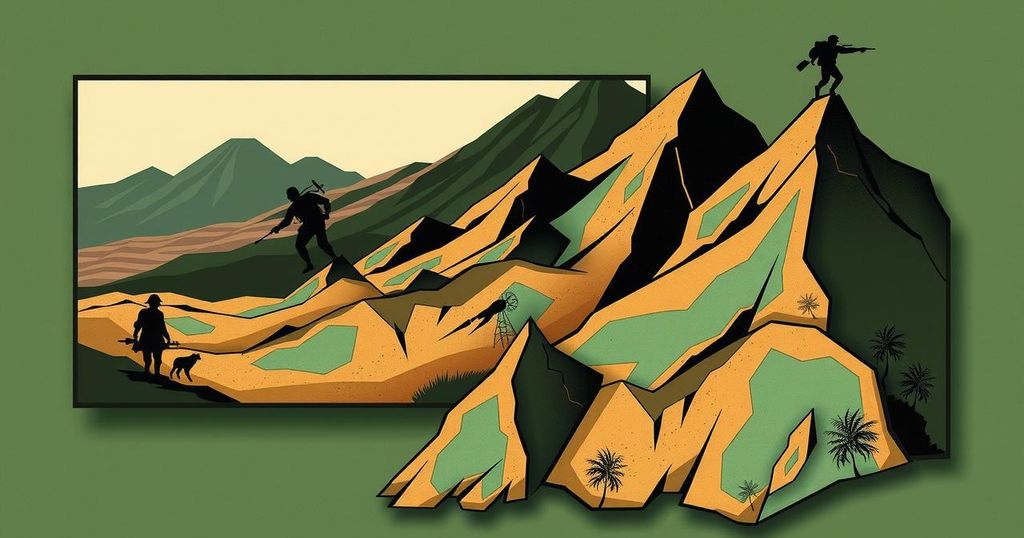World news
” TESONGO, AFRICA, ANGOLA, BORDER SECURITY, CIVIL WAR, CONGO, CONGO (KINSHASA), CORRUPTION, DEMOCRATIC FORCES FOR THE LIBERATION OF RWANDA, DEMOCRATIC REPUBLIC OF CONGO, DRC, FDLR, GOMA, HUMANITARIAN, JOÃO LOURENÇO, JOAO LOURENCO, KAGAME, NORTH AMERICA, PATRICK MUYAYA, PAUL KAGAME, RWANDA, RWANDAN DEFENCE FORCE, SOUTHERN AFRICAN DEVELOPMENT COMMUNITY, TESONGO, UN SECURITY COUNCIL, UNITED STATES, VICTOR TESONGO, WAR
Fatima Khan
0 Comments
Rwandan President Questions Troops’ Presence in DRC Amid Escalating Violence
Rwandan President Paul Kagame expressed uncertainty about the presence of Rwandan troops in the DRC amid escalating violence that has resulted in over 900 deaths. While he stresses Rwanda’s commitment to national security, DRC officials and UN experts claim the presence of Rwandan soldiers supporting the M23 rebels. The situation remains volatile as both nations prepare for potential escalations.
In a recent interview with CNN, Rwandan President Paul Kagame expressed uncertainty regarding the presence of Rwandan troops in the eastern Democratic Republic of Congo (DRC). This statement comes amid escalating violence in the region, which has left more than 900 dead and thousands injured due to confrontations between Congolese soldiers and the M23 armed group. Notably, many observers suspect that Rwanda is providing support to the M23, which has claimed control over the city of Goma.
United Nations experts estimate that between 3,000 and 4,000 Rwandan soldiers are actively involved in operations alongside M23 fighters, significantly outnumbering the insurgents. When pressed about these claims during the CNN interview, Kagame simply stated, “I don’t know”, despite being the commander-in-chief of the Rwandan Defense Force. He did acknowledge, however, that Rwanda would take action if its security were threatened.
The UN Office for the Coordination of Humanitarian Affairs reported that at least 900 bodies have been found in Goma since the outbreak of violence, highlighting the severity of the humanitarian crisis in the area. In response, M23 spokesperson Victor Tesongo denied receiving aid from Rwanda, calling the assertions unfounded and part of a broader manipulation of public perception.
Meanwhile, the DRC’s communications minister, Patrick Muyaya, has disputed Kagame’s claims, asserting that Rwanda’s military involvement in the DRC is well established. He pointed out that several entities, including the UN and regional leaders, corroborate the evidence of Rwandan troops in the area.
Kagame’s words echoed during the interview as he compared the narrative surrounding him to that of Vladimir Putin and Russia’s involvement in Ukraine. He remarked, “There will be so many stories,” further stating, “I may be called anything – what can I do about it?” His focus on national survival emerged as a recurring theme during the discussion, particularly regarding the threat posed by the Democratic Forces for the Liberation of Rwanda (FDLR), which he views as a significant danger to Rwanda’s security.
Despite the mounting international pressure, Kagame remained vague about the Rwandan military strategy, insisting that Rwanda would do what it deems necessary to ensure its protection. “Nobody is going to do it for us,” he told CNN, reiterating a commitment to safeguard his country against external threats.
The already tense relations with the DRC have further deteriorated following the M23’s advances into Goma. As cross-border shelling escalates, leading to casualties on both sides, DRC President Felix Tshisekedi vowed a determined response against the M23, labeling them as puppets of Rwanda. The M23, meanwhile, declared its intent to expand its influence beyond Goma, eyeing territories including South Kivu and the national capital. Its spokesperson expressed a commitment to overthrowing Tshisekedi, emphasizing a broader agenda to reshape governance in the affected areas.
In summary, President Kagame’s recent comments about the presence of Rwandan troops in the DRC underscore the ongoing complexity of the regional conflict. With rising casualties and increasing international scrutiny, the situation remains precarious, with implications for both national security and humanitarian efforts. Kagame’s insistence on self-defense and national determination has only fueled the tensions, drawing criticisms from DRC officials and complicating international responses to the crisis.
Original Source: www.cnn.com




Post Comment